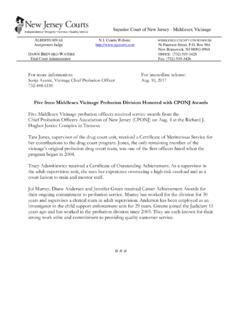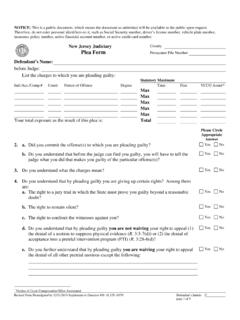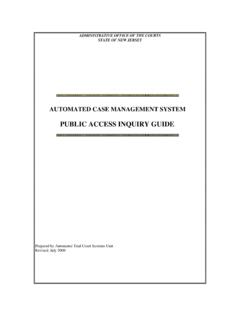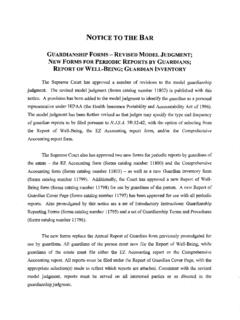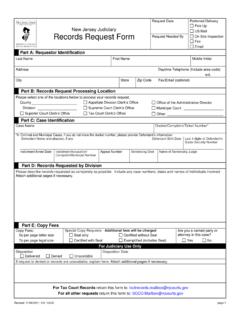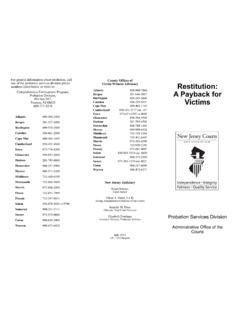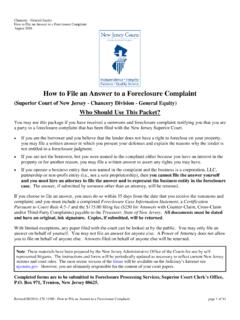Transcription of Superior Court of New Jersey Law Division, Civil Part
1 New Jersey Judiciary How to Enforce and Collect a Judgment Superior Court of New Jersey Law Division, Civil Part How to Enforce and Collect a Judgment Revised 08/2020, CN 11383 page 1 This booklet provides information on how to collect a judgment in a Civil case having a J or DJ docket number. It does not apply to judgments for child support , bail or restitution, or certain family cases. The information in this brochure also does not apply to judgments awarded in the Law Division, Special Civil Part, which have not been docketed with the Superior Court Clerk. The process for collecting judgments with SC or DC or L docket numbers is detailed in the brochure entitled, Collecting a Money Judgment, Law Division, Special Civil Part, which can be found on the Judiciary s Web site If you are owed money as a result of a judgment with a J or DJ docket number, you are a judgment creditor (creditor).
2 The person who must pay is the judgment debtor (debtor). judgments in New Jersey remain in effect for 20 years and may be renewed for an additional 20 years by filing a motion in the Superior Court , Law Division, Civil Part and/or in the Special Civil Part if the Special Civil Part case was assigned a DJ or J docket number. Information on how to file a motion and forms are available on the Judiciary s Web site. A docketed judgment becomes a lien against all real property owned by the debtor in New Jersey . If the debtor is unwilling or unable to pay you the money owed, there are several ways the Court can help you collect it.
3 The Court cannot guarantee, however, that you will be paid. Getting Information Regarding the Judgment Debtor s Assets and Income. Information Subpoena - If you do not know whether the debtor has a savings or checking account, what personal property the debtor owns or where the debtor works, you can use an Information Subpoena. An Information Subpoena is a set of written questions that can help you obtain information about the debtor s assets and income. An Information Subpoena form is on the Judiciary s Web site, There are two separate information subpoena forms - one is used for judgment debtors who are individuals and one is for business entities.
4 Once you have received answers to the questions on the Information Subpoena, you can ask the Court to allow you to attempt to collect the money owed you from certain assets or income belonging to the debtor, such as wages, automobiles, bank accounts and other personal property. You cannot, however, collect your judgment from the debtor s welfare benefits, Social Security, SSI, veterans benefits or unemployment benefits. Court Order for Discovery - You can also bring a motion for discovery which, if granted, will allow you to ask the debtor questions about his or her assets and income in person and under oath.
5 Information and sample forms on How to File a Motion in the Law Division, Civil Part, are available on the Judiciary s Web site, Ways to Collect on a Judgment Once you know that the debtor has income or assets, there are several ways you can try to collect the money that is owed you: Wage Execution - If the debtor works in New Jersey and earns more than $ per week, you can ask the Court for an order directing the debtor s employer to deduct a set amount from his or her paycheck until you are paid in full. This is called a wage execution or How to Enforce and Collect a Judgment Revised 08/2020, CN 11383 page 2 garnishment.
6 To request a wage execution, you must send a Notice of Application for Wage Execution to the debtor and his/her employer by regular and certified mail. A sample Notice is posted on the Judiciary s Web site. A copy of the application and a proof of service must be filed, along with a $50 fee, with the Civil Division Manager s office in the county where the case was heard. Both the original docket number of the case and the J or DJ docket number must appear on your application. If the debtor objects to the wage execution, before or after it is issued, the Court will schedule a hearing. If there is no objection or if the judge disallows the objection, the Court will issue an Order for Wage Execution.
7 Once you receive the signed order, you must prepare a Writ of Wage Execution. The Writ of Wage Execution is a document that gives the sheriff the authority to collect the money owed to you from the debtor s wages. A sample Writ of Wage Execution is on the Judiciary s Web site. You should then forward the writ of wage execution and the appropriate sheriff s service fee to the sheriff of the county where the debtor s employer is located. You should contact the sheriff s office in advance to determine the amount of their fee. Bank Levy - Another way to collect on your judgment is to have the sheriff get control of the debtor s bank account(s).
8 This is called a bank levy. To do this, you need a Writ of Execution, a sample of which can be found on the Judiciary s Web site. You must complete the writ form and send it to the Court . If the Judgment has a J docket number, you must send the writ to the Civil Division Manager in the county in which your case was originally filed. If the judgment has a DJ docket number, the writ is issued upon request by the Clerk of the Superior Court in Trenton. The Court fee for a Writ of Execution is $50. Once issued, you must send the writ with the applicable sheriff s fee to the sheriff in the county in which the bank is located.
9 Before sending the writ to the sheriff, you should contact the sheriff s office in advance and inquire as to the applicable fee. Be sure to include the name of the bank, the address, and the last four digits of the account number when you send the writ to the sheriff. The sheriff will notify the bank of the writ and the account will be frozen. You must then a file a Motion to Turn Over Funds with the Court and serve a copy on the sheriff, the bank and the debtor. A motion packet with sample forms is available on the Judiciary s Web site If the debtor does not object to the motion, the judge will sign the order.
10 If the debtor objects, a hearing will be held. Once the judge signs the order, you must send it to the sheriff in the county where the bank is located, to the bank and to the debtor. The sheriff can then go to the bank and get the money from the account. Execution on Other Assets - You also can look to other assets to satisfy the judgment. If you know what personal items the debtor possesses, such as office equipment or vehicles, you can apply to the Court for an order to let the sheriff enter the debtor s property. The sheriff can then seize those articles and try to sell them at a public sale.
